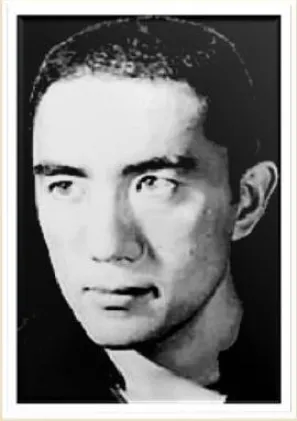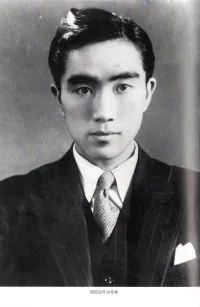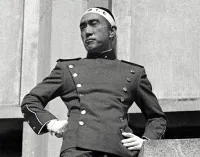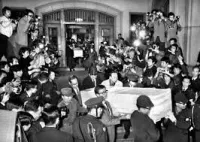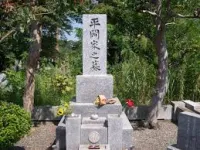Biography
1925 - 1970
“True beauty is something that attacks, overpowers, robs, and finally destroys.”
- Yukio Mishima
He began writing poems and stories at an early age and had published widely before the success of his second novel, Confessions of a Mask (1949), made him one of the most famous writers in Japan. Largely autobiographical (although he later denied it) Confessions of a Mask was the first modern Japanese novel to deal openly with male homosexuality. Though Mishima did marry and father two children, he was most clearly attracted to men and was accepted by his many fans as bisexual. His preoccupation with masculinity led to a fanatical obsession with bodybuilding, martial arts and military training. Mishima’s failed over-throw of Japan’s Self-Defense Forces – where he had urged troop revolt, restoration of the imperial system and reinstatement of military sovereignty – drove him to perform ritual suicide in 1970. Despite publishing some 40 novels, 18 plays, numerous essays – and acting on stage and in films – Mishima remains a paradoxical, enigmatic figure for Japanese and non-Japanese alike. Finding modern life sterile and unsatisfying, he sought meaning in the love of comrades, manly action, and a very Japanese devotion to the nobility of failure.
1925 - 1970
“True beauty is something that attacks, overpowers, robs, and finally destroys.”
- Yukio Mishima
He began writing poems and stories at an early age and had published widely before the success of his second novel, Confessions of a Mask (1949), made him one of the most famous writers in Japan. Largely autobiographical (although he later denied it) Confessions of a Mask was the first modern Japanese novel to deal openly with male homosexuality. Though Mishima did marry and father two children, he was most clearly attracted to men and was accepted by his many fans as bisexual. His preoccupation with masculinity led to a fanatical obsession with bodybuilding, martial arts and military training. Mishima’s failed over-throw of Japan’s Self-Defense Forces – where he had urged troop revolt, restoration of the imperial system and reinstatement of military sovereignty – drove him to perform ritual suicide in 1970. Despite publishing some 40 novels, 18 plays, numerous essays – and acting on stage and in films – Mishima remains a paradoxical, enigmatic figure for Japanese and non-Japanese alike. Finding modern life sterile and unsatisfying, he sought meaning in the love of comrades, manly action, and a very Japanese devotion to the nobility of failure.
Demography
Demography
Gender Male
Sexual Orientation Bisexual
Gender Identity Cisgender
Ethnicity Asian/Pacific Rim
Nations Affiliated Japan
Era/Epoch Modern Japan Shōwa Period (1926–1989)
Field(s) of Contribution
Author
Poet
Commemorations & Honors
Shincho Prize from Shinchosha Publishing For The Sound of Waves (1954)
Kishida Prize for Drama from Shinchosha Publishing For Shiroari no Su 白蟻の巣, "Termites' nest" (1955)
Yomiuri Prize from Yomiuri Newspaper Co. For Best Novel The Temple of the Golden Pavilion (1956)
Shuukan Yomiuri Prize For Shingeki From Yomiuri Newspaper Co. For Bara to Kaizoku 薔薇と海賊, "Rose and Pirate" (1958)
Yomiuri Prize from Yomiuri Newspaper Co., For Best Drama Toka no Kiku 十日の菊, "The Chrysanthemum on the Tenth", "The Day After the Fair" (1961)
Nobel Prize in Literature Finalist (1963)
Mainichi Art Prize From Mainichi Shimbun For Silk and Insight (1964)
Ministry of Education Art Festival Prize For Madame de Sade (1965)
Inaugural San Francisco Rainbow Honor Walk Honoree (2014)
Demography
Gender Male
Sexual Orientation Bisexual
Gender Identity Cisgender
Ethnicity Asian/Pacific Rim
Nations Affiliated Japan
Era/Epoch Modern Japan Shōwa Period (1926–1989)
Field(s) of Contribution
Author
Poet
Commemorations & Honors
Shincho Prize from Shinchosha Publishing For The Sound of Waves (1954)
Kishida Prize for Drama from Shinchosha Publishing For Shiroari no Su 白蟻の巣, "Termites' nest" (1955)
Yomiuri Prize from Yomiuri Newspaper Co. For Best Novel The Temple of the Golden Pavilion (1956)
Shuukan Yomiuri Prize For Shingeki From Yomiuri Newspaper Co. For Bara to Kaizoku 薔薇と海賊, "Rose and Pirate" (1958)
Yomiuri Prize from Yomiuri Newspaper Co., For Best Drama Toka no Kiku 十日の菊, "The Chrysanthemum on the Tenth", "The Day After the Fair" (1961)
Nobel Prize in Literature Finalist (1963)
Mainichi Art Prize From Mainichi Shimbun For Silk and Insight (1964)
Ministry of Education Art Festival Prize For Madame de Sade (1965)
Inaugural San Francisco Rainbow Honor Walk Honoree (2014)
Resources
Resources
Jackson, Earl, Jr. "Kabuki Narratives of Male Homoerotic Desire in Saikaku and Mishima." Theater Journal 41 (1989): 459-477.
Nathan, John. Mishima: A Biography. Boston: Little, Brown, 1974.
Shrader, Paul, dir. Mishima: A Life in Four Chapters. With Ken Ogata and Toshiyuki Mizushima. Zoetrope Lucas Film, 1985.
Stokes, Henry Scott. The Life and Death of Yukio Mishima. New York: Farrar, Straus and Giroux, 1974.
Wolfe, Peter. Yukio Mishima. New York: Continuum, 1989.
http://blogs.villagevoice.com/runninscared/2010/11/i_knew_mishima.php
https://www.makingqueerhistory.com/articles/2017/10/1/yukio-mishima
Resources
Jackson, Earl, Jr. "Kabuki Narratives of Male Homoerotic Desire in Saikaku and Mishima." Theater Journal 41 (1989): 459-477.
Nathan, John. Mishima: A Biography. Boston: Little, Brown, 1974.
Shrader, Paul, dir. Mishima: A Life in Four Chapters. With Ken Ogata and Toshiyuki Mizushima. Zoetrope Lucas Film, 1985.
Stokes, Henry Scott. The Life and Death of Yukio Mishima. New York: Farrar, Straus and Giroux, 1974.
Wolfe, Peter. Yukio Mishima. New York: Continuum, 1989.
http://blogs.villagevoice.com/runninscared/2010/11/i_knew_mishima.php
https://www.makingqueerhistory.com/articles/2017/10/1/yukio-mishima
